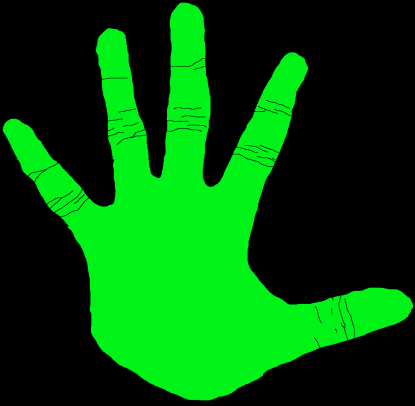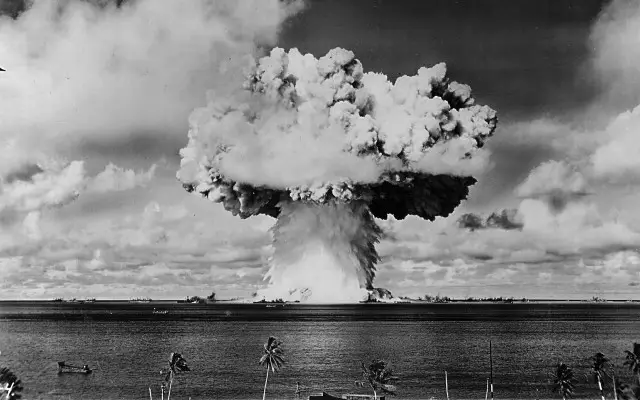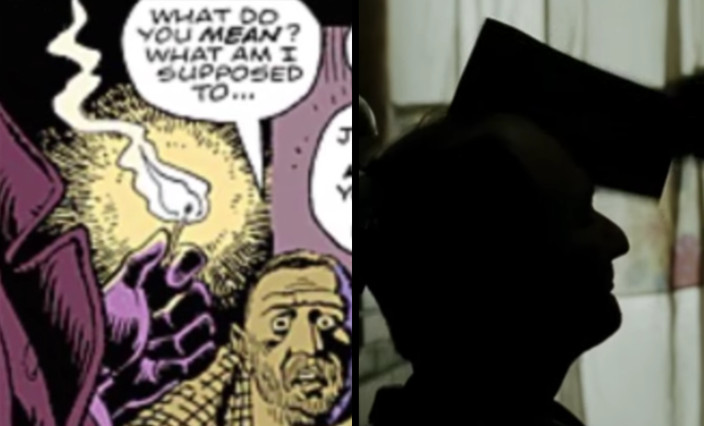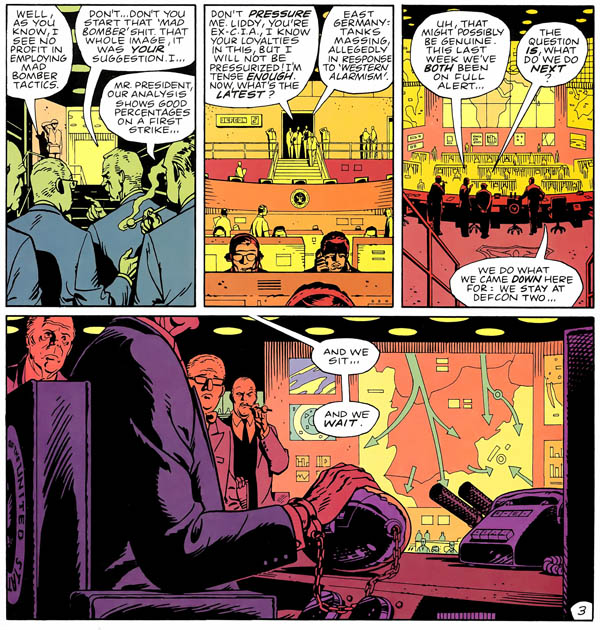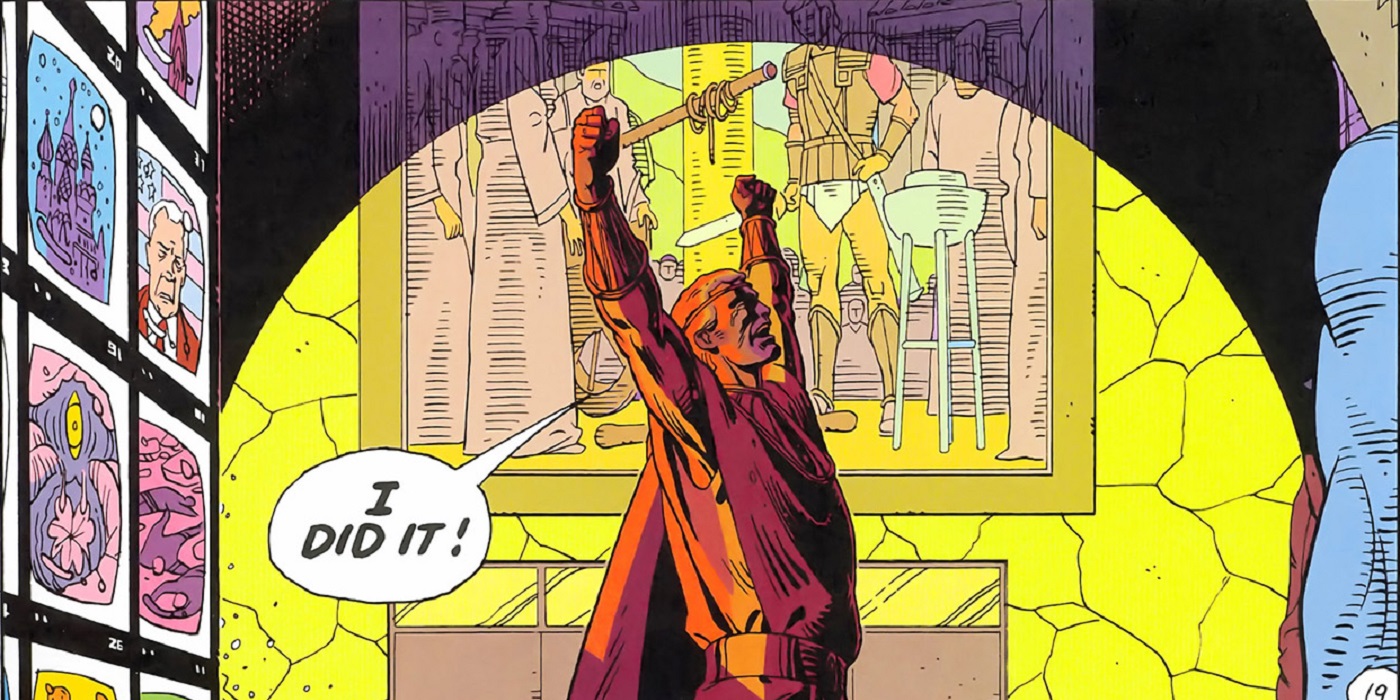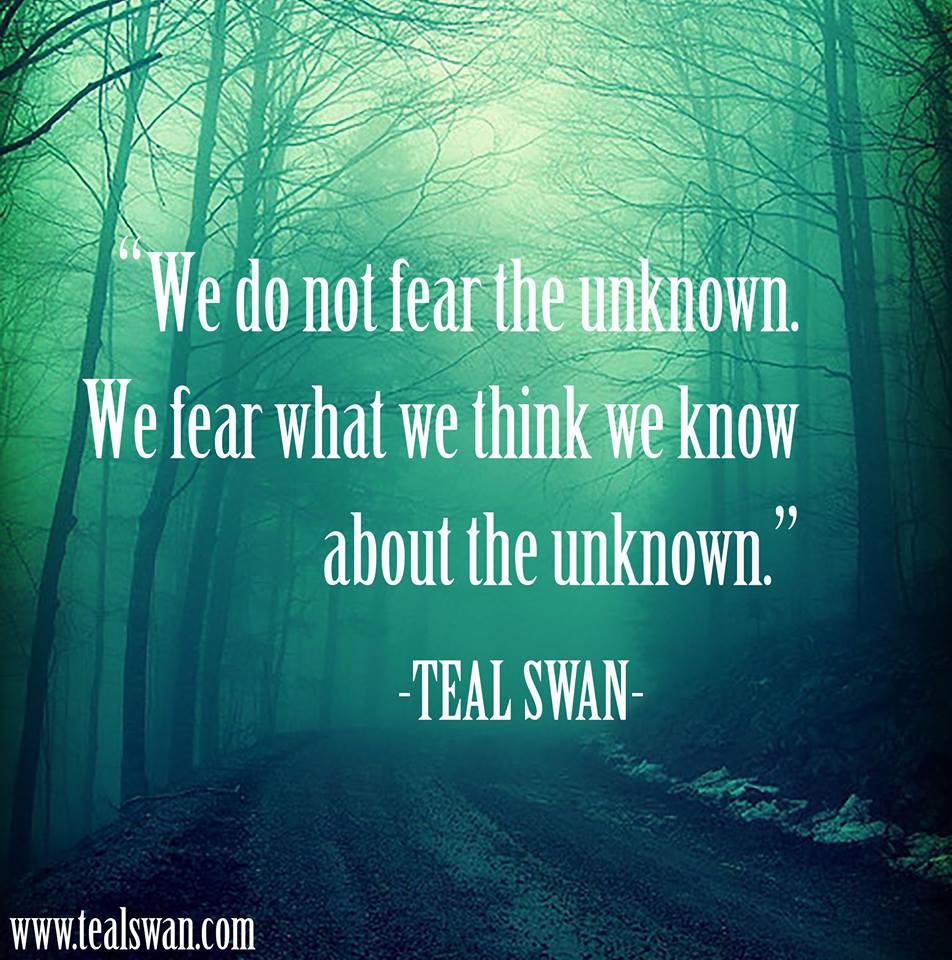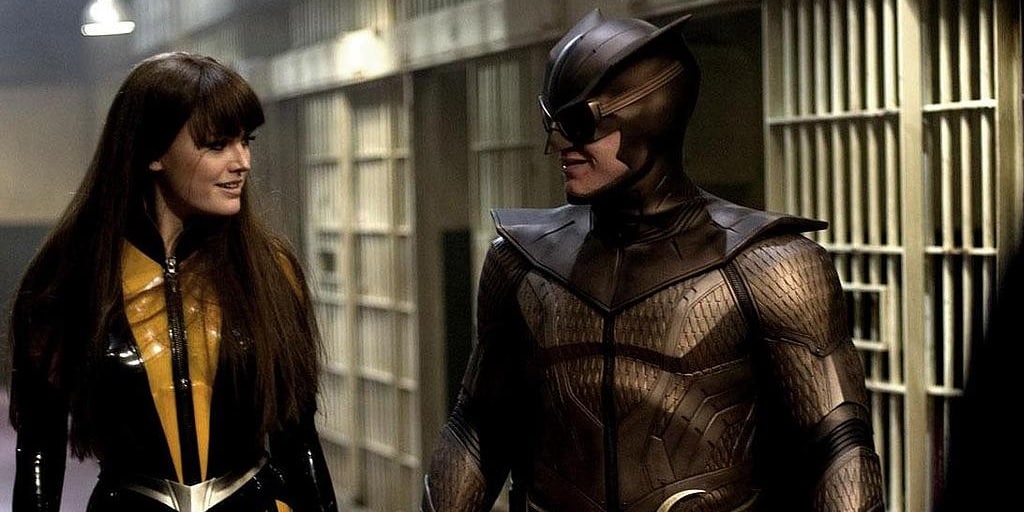
Comic rated: 5 / 5
The test of a politician’s greatness is the success of his plans and enterprises — in other words, his ability to reach his goal. Conversely, the theoretician’s final goal can never be reached; human thought may grasp truths and envision ends that it sees with crystal clarity, even though such ends can never be completely fulfilled because human nature is weak and imperfect. The more correct an idea is in the abstract, and therefore, the more powerful, the smaller the chance of putting it into practice — at least as far as this depends on human beings. The significance of a theoretician doesn’t depend on the practical success of his plans, but rather on their absolute truth and the influence they exert on the progress of humanity.
Adolf Hitler, Mein Kampf Ch.8.3

Movie rated: 2.5 / 5
For the record, there will be spoilers. It’s highly advised you read the comic first before reading this review. “But what if I don’t want to read the comic? What if I’m content with just watching the movie instead?” Then God help you.
Part 1: Beginnings
I was told to put up or shut-up about how the Watchmen movie is inferior to the comic. Challenge fucking accepted! And if you’ve seen how much of a hardass I can be with comic-to-film adaptations with The Killing Joke, you could imagine how I’ll be with this.
The Watchmen comic challenges the reader with questions regarding morality, how civilizations/nations should proceed into the future, how mankind should change in the present for a better future (or even just to have a future). It dares readers to consider extreme points of view while still acknowledging that these extremist views, while possible solutions to problems, have their own flaws (while allowing readers to still think they are altogether just bad ideas that should remain deplorable and never to be implemented). It wants the reader to think. It wants the reader to ponder. It encourages critical thinking while still being a solid story in-of itself told very well with strong characters and character arcs.
And the film fucks that all up by altering or adding stuff that takes away what was there for the critical thinking aspect. No longer are viewers challenged to ponder moral/ethical/political/societal/extremist views. The film simplifies or just flat out tells the viewer what to think on these issues. Whether it’s because Snyder (and/or all other parties involved at the corporate level) doesn’t believe an audience should be challenged on those viewpoints, doesn’t believe they should consider those viewpoints, or that he/they never even considered those were viewpoints worth the viewer’s consideration to begin with (if the latter, then he and/or others involved with the film adaptation are fucking morons). Evidence of dumbing down this story in ways that are subtle but no less damaging to the original comic’s powerful messages begins with the first scene of the film, and would only get worse from there (particularly during the finale).

Both begin differently. The comic begins with an entry from Rorshach’s journal; which if you know how this ends is quite appropriate, as if you’re reading this through the eyes of the last person we see acquire the journal, thus lending itself to a circular idea that this story should be re-experienced again. This isn’t something film can replicate due to being a different medium, so I wouldn’t be too peeved if this was altered so long as the manner in which it was altered is appropriate. You have to consider the thematic implication of each.
Dog carcass in alley this morning, tire tread on burst stomach. This city is afraid of me, I have seen its true face.
Rorshach, Ch.1 p.1
The comic begins (and in another way ends) with Rorshach, who has a monotone voice. A man who is fed up with how deplorable, sick, and vile the world has become. All about his perspective. A perspective that readers are likely to share. Sick of how bad things are in the world. Thus having something relatable for readers so they can ease themselves into the story.
The film begins differently. Rather than being more vague and generalized about the decay and death of civilized society, it’s more direct. How direct? Politically direct.
Wrong as usual! The United State’s lack of action in Eastern Europe proves that the Soviet Union’s aggression at the Afghan border will not be opposed publicly by the United States!
Zack Snyder’s Watchmen, some schmuck newscaster
RIGHT AWAY!!!! From the first two fucking sentences uttered in the movie! It not only acknowledges that a film adaptation of a comic is WRONG AS USUAL, it makes the first major fuckup as an adaptation! The Soviet Union was too fucking scared of the U.S. because they had Dr. Manhattan. They wouldn’t have the balls to make any offensive gestures that would risk the anger and wrath of the U.S. while they had their blue dildo superhero who is capable of wiping them out with ease (with some potential fallout done to the U.S.). They don’t have their own superheroes capable of putting up any sort of a fight against him! And if we’re to go with the idea that they are acting aggressively because they have actually developed weapons to utilize against Dr. Smurf, then that makes the alteration of the finale even more fucking stupid!
Alterations to a story many consider a masterpiece for the sake of putting a unique twist onto it being a good idea? WRONG AS USUAL!
Part 2: Subtle Fights in the Cold War
Moving on…
What follows is a statement about how the Cold War is steaming towards a Hot War that threatens the destruction of mankind, let alone just wreaking havoc on most major cities on at least one of the continents. This is not only something viewed without the narration of an individual watching this unfold so we can hear his thoughts on the matter (thus losing the personal aspect), but also the relatability. Who really gives a shit about the Cold War in this day and age (or on any event over 20 years after it had ended)? The most important aspect of a story, especially one such as this, is the characters. Who they are and how they feel is more timeless than any political event or period of war. It loses the ability to become timeless, in a story about a clock ticking down to doomsday.

And then there’s the fight sequence itself. Now look, Zack Snyder can shoot a decent action sequence. In fact, he can shoot a decent scene period. He knows his craft, and knows how to make a scene look crisp and borderline fantastic. But what he has in flash he lacks in substance. Or more accurately in this context, he lacks subtlety. This fight sequence, as with just about every fight sequence in this movie (and in just about every buttfucking animated DC film ever made) goes on for too long, shows too much, and creates implications that shouldn’t have been in there to begin with. The fact that we see The Comedian put up a fight. That he is, in a sense, consigned to his fate. That he is still laughing at the nihilism of the whole thing.
While as in the comic, there’s none of that. The best we get from this fight (portrayed as a one-sided beatdown) is 10 frames, about half of which only involve busting a door down and The Comedian falling to his death. Not once do we see him smile in that, as if there’s no acknowledging the irony of all this. We see a surprised, tired, exhausted face. A man who has lost his sense of humor.
All things considered, it’s fitting, as that’s dark humor (irony) right there. And that’s something prevalent throughout the comic itself, dark humor. The various situations and events that occur or have occurred that are hilarious under a certain point of view. In a world gone mad, one of the ways of keeping one’s sanity is by seeing the irony of it all, and just laughing at it. In today’s context, this is relatable, as there are those who say we are living in Clown World.
So the film loses points for losing that subtle bit of irony. Like I said, one of Snyder’s weaknesses is not knowing subtlety. Or if he does know it, he implements it at the wrong place at the wrong time. And his lack of subtlety makes him emphasize on the action (and sex) more than on the other more important aspects. Considering how much time one is allowed to fit content into a film, even in an Ultimate Cut that runs for three-and-a-half hours, it should be spent wisely. The fight sequence is not time well-spent precisely because it focuses more on the flash than on the substance.
And if anything else, the point of that fight sequence should be shock. In the film’s case, it did serve another purpose. To showcase the strength and skill of both The Comedian and his assailant. In that both are above-average when it comes to both. Why make this point? What purpose does something like this usually entail? To have us fear the culprit by demonstrating his capabilities. To that I say rubbish. His capabilities are demonstrated (and even hinted at) later on in the story, rendering this purpose meaningless. Better to keep that a mystery at the start, especially since the identity is supposed to be a mystery as well. And this argument can be made even if we are to assume portraying this fight in this detail at the expense of eliminating the possibility of The Comedian not putting up a fight was a good idea to begin with (which it isn’t).
And on top of all that, their strength is exaggerated. While these may be above-average human beings, they are still fucking human beings without any genetic modifications made to themselves to make them this super strong, being capable of throwing 250+ pounds of muscle like a ragdoll. The whole point of every single one of these characters, save for Dr. Manhattan (I’l use his actual character name now), is that they are to be relatable. That they are (or were once) used to inspire others to be like them. To be heroes capable of making the world a better place. At least until the Keene Act was passed which outlawed vigilantes (and thus masked heroes, unless they worked for the government, because of course it’s always “rules for thee but not for me” when it comes to government workers and politicians, let alone rich corporations and banks).
This is just the first scene of the movie, and already there’s some problems that become more amplified as the film goes on. Like in the alleyway fight with Dan (Night Owl) and Laurie (Ms. Jupiter).
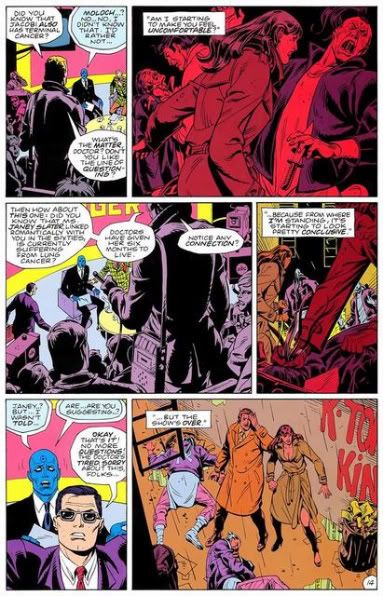
Why swap the positions of Dan and Laurie at the end of the alley fight (her on the left, him on the right)? It’s not significant (as far as I can tell), but why? On that note though, I do have a problem with how they handled that fight. Aside from wire-work to once again exaggerate the strength of our “superheroes” (who aren’t supposed to be Super, except for Dr. Manhattan), it’s how vicious Night Owl and Ms. Jupiter are during this fight. Breaking noses, teeth, and bones are one thing, but just straight up murdering a thug with a stab to the throat, and how the camera excessively focuses on the most bloody and violent aspects of the fight. It’s a betrayal of character for both those people. They are fighting the way Rorschach would fight, they are fighting like they really want to kill someone, when really they should be a bit more on the pacifist side of things, by only doing as much harm as necessary. In the comic, we never once see them do a lethal blow during that entire skirmish. There were a couple brief bloody moments in the comic, sure, but it didn’t revel in it, and the characters didn’t want to revel in it. Laurie primarily wanted to just blow off steam, and Dan didn’t exactly want to go down that route and get into a fight that evening. It’s all so questionable with how the film handled it.
I mean, Jesus suffering Christ, they were more soft on the prisoners in the prison fight sequence. And that’s another example of Snyder indulging too much in having overlong fight sequences just for the sake of having them. You would think that would be the instance where these psychotic superheroes would decide to go apeshit on criminals in a way normally reserved for Rorschach and the Comedian, but apparently not. You’re capable of doing things right you fucking movie! You just choose not to!
The one case where the film adds some action to an otherwise straightforward sequence in the comic that actually works is with Hollis Mason and the knot heads. I actually liked that he put up a fight, bringing up some of his past instincts, while also offering some flashbacks of his glory days. That was good stuff.
Part 3: Politics and Bullshit
The film is filling in gaps that shouldn’t have been filled, let alone didn’t need filling, in addition to making alterations to the story.

On that note, we also get our first alteration soon after this when the detectives show up to investigate the crime scene. In the comic, one of the detectives finds a picture of The Comedian shaking hands with Vice President Ford. In the film, he is shaking hands with President Nixon. It’s one of those changes that makes me ask, “Why?” Why would you change that? What purpose does it serve? Because Nixon is more recognizable? This leaves out some of the fun with regard to the alternate history this film has (the alternate timeline basically begins in 1938, maybe 1939 if we wanted to push it). Ford became president after Nixon was forced to retire in reality, so naturally he is Vice President in this alternate history. A subtle way of indicating this, and it becomes more apparent later on. Plus it raises questions as to what kind of a man Ford and/or the Comedian is for them to shake hands with one another, as opposed to what kind of a man Nixon and/or the Comedian is.
But enough about the irritations of the film. I’m going to bitch about something exclusively in the comic.
They had a choice, all of them. They could have followed in the footsteps of good men like my father, or president Truman.
Decent men, who believed in a day’s work for a day’s pay.
Instead they followed the droppings of lechers and communists and didn’t realize that the trail led over a precipice until it was too late.
Don’t tell me they didn’t have a choice.
Rorshach, Ch.1 p.1
Bullshit alert. Truman a good man? What standard is he basing that on? The same standards as the guy who gave the okay to drop the atomic bombs on Japan? The same standards as the guy who was a pussywhip when it came to handling the Korean War? The guy who attempted the implementation of the Fair Deal, which amounted to national medical insurance, federal housing programs, a higher minimum wage, assistance for farmers, increases in Social Security and civil rights reforms, and ended segregation and discrimination in the military and government jobs (which is about as liberal as you can get, and Rorschach would bitch about the liberals to a small extent on that same page I just quoted)? The guy who recognized the state of Israel (though there’s more to that story than you would think)? The guy who signed the National Security Act which resulted in the creation of the CIA? That guy?
Something tells me Rorschach isn’t the best judge of character. Then again, he is supposed to have flaws (as I’m sure everyone in this comic does). It becomes part of his backstory that he admired his father partly because he never knew him. A boy without a true father figure. Whatever glimpses he had into his father is something he latched onto. Being a fan of Truman is one. It’s this extremist position of taking radical measures to resolve crisis/conflict/war quickly and directly (WWII) that Rorschach adopts and admires in other people. Which becomes quite ironic with how he views a similar position during the finale (more on that later). Again, “irony,” dark humor, a main point in the comic that is too blatant to ignore as a minor element.
Either way, we’ve got an alternate history going on here. Meaning presidents made different decisions, different historical events have occurred. Nixon is still president, despite resigning (amidst the Watergate scandal) in 1974. This is an alternate historical timeline. But any respectable alternate history story exists to compare and contrast to actual events, posing the questions of, “What could’ve happened if this event occurred instead? What could’ve happened if this individual made this decision rather than that decision? Do you believe in Rapture?”
Yes, we were crazy, we were kinky, we were Nazis, all those things that people say. We were also doing something because we believed in it. We were attempting, through our personal efforts, to make our country a safer and better place to live in.
Alan Moore’s Watchmen, Under The Hood Ch.III p.8
There is one addition the film makes to the comic that I didn’t mind. A very subtle moment with Rorschach flicking the switch to his flashlight, but it doesn’t turn on, so he smacks it a few times to get it working. It’s a nice touch to show that this guy isn’t perfect at what he does. I also liked what they added to the scene of Rorschach finding The Comedian’s hidden stash (though I didn’t care for how futuristic, by 80s standards, it looked); the newspaper ad of him capturing Moloch, the subtle foreshadowing of his relation to Miss Jupiter. Not everything the film adds is bad. That being said, really not a fan of the timing of Rorschach’s narration during this scene. It just doesn’t match what’s visually going on. Like he’s 1-2 minutes too late or early with what he’s saying. It’s very strange.
Then they lose whatever kudos points they just built up by having a completely unnecessary (and not in the comic) sequence of Rorschach confronting these cops who show back up to the crime scene. To be fair, this does lead in to this news piece briefly viewed by the Night Owl that does act as a decent and brief info dump about Rorschach’s wanted status. Still, I find that addition questionable. Especially within the context of the comic. Which brings me to the Keene Act, passed in 1977 of this timeline, around the time the Police Strike happened. Not sure if that was before or after the passing of the act; probably before considering how the Nite Owl was involved with riot control, and he wasn’t an official government employee unlike the Comedian. The point being Rorschach was the main “superhero” who openly defied this law by continuing to beat on major criminals, and leave them for the police with messages directly aimed at law enforcement and government officials who supported the Keene Act. Thus implying their sole reason for hating him was because of his open defiance of the law and disrespect for the cops, not because he has a history of kicking the shit out of them (there would be a more concerted effort at apprehending him if he did that off and on). It’s to question if law enforcement should even be trying to apprehend a vigilante, while in the film it becomes more like, “Well of course they’re going to try apprehending him and make a big deal about apprehending him if he’s going to be assaulting police officers as well.” Yet another addition that irritates me.
And what’s up with making the newspaper guy out to be a bigger asshole? In the comic, he had and gave Rorschach the paper he wanted. In the movie, he doesn’t have it (or claims to not have it). Very strange. And there’s that dumb added bit of the black kid calling him out on his claim of “being informed.” Little dab of SJW stuff there (blacks know better than whites), and it’s a betrayal of his character. It’s subtle, but the subtle moments are what gives depth to the story, and considering I’m retreading ground here, I’d like to know how deep or shallow a story I already know really is. The black kid who reads the comics is supposed to be a character who is completely shut off from everything going on around him, only being focused on the comic he’s reading, and then just bitching about it. He’s not supposed to be someone who makes remarks to the people around him, not unless they’re going to disrupt his reading.
And then there’s this bit with fucking Veidt (aka Ozymandias):
If we make resources infinite, we make war obsolete.
Ozymandias going all Jean Luc Picard
Not something I recall Veidt saying in the comic. In fact, that seems like another plot hole considering that is a plausible outcome, all things considered. Another addition I find questionable. And while the dialogue exchange between Veidt and Dan (Night Owl) provided good background and such, it comes at the expense of not having Rorschach have that conversation. On the other hand, that does raise questions in the comic version as to how Rorshach was able to meet with Veidt in his building without getting caught or stopped by security, or anyone else. To be fair, he is shown to be stealthy and capable of bypassing security in various places. But still, this is Veidt we’re talking about here, a very intelligent man with high tech buildings and equipment. Honestly, I don’t mind this change all that much, even if this harms the notion that Rorschach has connections to all these people.
And then there’s a bunch of little things sprinkled throughout this film that annoyed me.
Why alter the dialogue between Rorshach’s first meeting (that we see) with Dr. Manhattan and Laurie (Ms. Jupiter)? Much of the information exchanged in that scene in the film was exchanged during the talk on Mars much later on. And it avoids demonstrating how emotional Laurie is (let alone how she feels about the Comedian due to his history with her mother), how Jon (Dr. Manhattan) has feelings for her. Probably because they wanted to emphasize more on how disconnected Dan is getting towards everyone, and to make Laurie less of a drama Queen. Rubbish.
Why alter how the scene ended with the Comedian getting beaten by Hooded Justice? With him pointing out something about Hooded Justice?
The bits of dialogue they left out between Blake (the Comedian) and Dan at the end of the Vietnam War, how most of the Vietnamese won’t really give a damn about who won the war so long as the war is over. Or altering the bit where Blake guns down this pregnant Vietnamese girl, having her panicking after what she did to his face as opposed to seemingly accept her fate (with the scar she left him being an intentional permanent reminder). And how that acceptance of their fate links back to Blake potentially accepting his fate at the start of the story (at least in the comic version).
Altering that hero meeting with Blake burning up the map (basically removing the presence of Captain Metropolis).
Not a fan of “old people makeup” on younger actors and actresses when they could just hire some old person to play the part. It may have worked with the Comedian in this film, but not Silk Spectre.
Part 4: The Power of the Pussycakes
A little girl-power moment with Laura physically assaulting this government official who questions her about getting into a fight with Dr. Manhattan which may have inadvertently caused him to leave. And she fucking humbles the guy. That little assault moment didn’t happen in the comic, and it’s kinda stupid too given the whole power structure dynamic between the government and the people (not to mention every side is to be flawed here). Plus there’s the whole knocking the guy out and “escaping” from the government compound; even though in the comic they basically just kicked her out and basically made her lose all her government benefits (welfare’s a bitch). The film want to have more female empowerment. Fits in with my theory that PC SJW themes and messages (subliminal or blunt) were becoming more noticeably prevalent in film on a general scale ever since 2006 at the earliest, 2012 at the latest, with 2008 being the most likely candidate. Make no mistake, this whole “female empowerment” alteration bullshit does take away from the story. I’ll mention how later.
Speaking of PC SJW themes getting added into the story in places the comic didn’t have them (make no mistake, the comic is also critical of capitalism, but in different more subtle ways while also taking jabs at socialism), though this isn’t something I can blame entirely on the 2008+ PC trend as the 90s had plenty of this in their films as well, the corporate capitalist bashing. In a scene where Veidt is having a talk with these nameless corporate guys about gas and oil power (which is something I find to be a questionable topic of discussion given how Dr. Manhattan and his supply of lithium caused flying cars and alternative electrical powered stuff) vs. limitless resources at the expense of corporate profit. Then, to stick it to them even further (while bragging about how his capitalist ventures allow him enough money and power to make limitless resources for everyone possible; guess socialists need capitalists to actually accomplish stuff), the film has this gunner show up and gun down this secretary chick (in a very violent fashion) along with one or two of the corporate guys, before Veidt takes him down. This just puts forth a “stick it to ’em” feeling when it comes to bashing the rich. While in the comic, only the secretary gets killed, creating its own sense of loss and isolation for Veidt which becomes more pronounced later on in the story when revelations come about. Yet another instance of the film adding onto the story which winds up taking away from it.
And the scene in the prison interrogation room where Rorschach is with the psychologist. I don’t get this. Why would they alter the psychiatrist into being someone who already seems like a grim somewhat pessimistic individual, as opposed to someone who has his positive attitude and outlook on life shaken due to his interviews with Rorshach?
Part 5: The NNCC (Nixon, Nazis, and other Cardboard Cutouts)
The film wants to vilify Nixon. Compare how the comic mentions Nixon asking Dr. Manhattan to intervene in Vietnam compared to the movie.
In January 1971, President Nixon is asking me to intervene in Vietnam, while ten years earlier Kennedy is avoiding any mention of Cuba.
Watchmen comic, Ch.4 p.19
In January 1971, President Nixon is asking me to intervene in Vietnam, something that his predecessors would not ask.
Watchmen movie
Right, like Truman? Keep it narrowed down to America’s favorite liberal sweetheart JFK, it makes it a little less complicated, and keep things focused on how each individual would handle things differently; rather than try to be generalized about the whole thing.
The scene where Rorschach becomes Rorschach, where he tracks down the guy who kidnapped and killed this girl. In the comic, the man acts bewildered and claims to have done nothing the entire time (though there is subtle indications with what he says to state that he did kill the girl, or at the very least knows the person who did). In the film, the guy just straight up admits he killed the girl. We’re not allowed to have some room for doubt here? Not to mention we see Rorschach outright kill the guy as opposed to going all Mad Max on him. This blunt attitude of the film makes the entire story suffer.
Making the neo-nazi skinheads (ie the Knot Tops) out to be bigger pricks than they are in the comic. Even in the sequence where they murder Hollis Mason. In the comic, a couple of them were like, “Jesus Christ dude, why the hell did you do that? I thought we were just going to rough him up a bit.” Dialogue like that, showing that they don’t all think alike, that some are more compassionate than others, a fact of every group and organization, even extremist ones. While I did actually enjoy the aspect of the film that showed Mason fighting back against these guys (it worked in this sequence, pretty damn well too, unlike the Comedian fight at the start of the film), that ends up taking away some kudos points it built up with that sequence. This is a favorite pastime of Hollywood. Any chance they can get to have some form of nazi in a film, they will amplify the stereotypical 2-dimensional villain trait that they must possess lest they be considered human. The one instance where the film tries to show some humanity towards the group is when Night Owl is beating up one of those guys at the bar, with what the guy says prior to getting his teeth knocked out (an instance where even Rorschach is like, “Hey take it easy dude,” which makes the excessive violence in the alleyway fight earlier even more odd).
The only people Hollywood like to villainize almost as much these days, corporate elites aside (very misguided in how they do that when they do it anyway, as if it’s never misguided when anyone is overvillainized) is police. And yep, they do a bit of that here too. Not so much villainizing them so much as making them out to be more of a nuisance than anything else (though the subliminal villainization is there, with how much the film revels in giving them beatdowns, primarily by Rorshach, partly in this one instance by Ms. Jupiter).
There’s also Hollywoods favorite man to bash next to Joseph McCarthy, Richard Nixon. Man do they love taking to that guy. Him saying, “Take us to DEFCON 1.” For fuck’s sake, that didn’t happen in the comic! And there’s a good reason why that didn’t happen in the comic! The whole motherfucking incident with the Russians and Americans moving towards an inevitable nuclear confrontation is meant to mirror that instance when Russian ships were transporting nuclear weapons to Cuba, and how the U.S. navy made a barricade that the USSR was threatening to break. The Cuban Missile Crisis. The Day the Earth Stood Still. How everyone was tense as hell during the moment in time, expecting the USSR to rush the barricade and instigate the nuclear war. But that didn’t happen. They showed reason, and thing de-escalated from there. Even Nixon in the comic, he was at his underground base during DEFCON 2, expressed rage when anyone tried to peer pressure him into making a drastic military decision. He just stated, “We will sit and wait.” Waiting to see what happens, hoping that things won’t get worse, that things will de-escalate. Which makes the drastic measures Veidt makes later on even more questionable with that bit of history in mind, noting that maybe things would de-escalate, the the world’s problems could potentially be resolved without killing millions to inspire fear of some external force everyone needs to unite against. Another instance of overvillainizing someone to make things less thought-provoking, taking away some humanity from the characters in the story, for the sake of making a typical Hollywood punching bag out of them.
Part 6: The Ending Can Go Fuck Itself
Why bother having the fucking genetically engineered lynx in the film if that’s not going to be a major part of the plot like it was in the comic? Which brings me to the cocksucking finale in this fucking film, the most divisive part in this entire thing (only reason it’s divisive is because there’s too many dumb fucks who can’t tell how the comic is better, probably because they don’t have the time or the mental capacity to analyze it and arrive at that conclusion, which makes them unfit to be critics capable of making that claim). The plot twist of Dr. Manhattan being responsible for the bombings around the world (in the comic, it was just in New York, not globally), as opposed to some giant squid monster straight out of Lovecraftian lore.
There are plenty of subtle indicators littered throughout the entire comic foreshadowing the arrival of the Cthulhu squid, and slaughtering everyone within like, I don’t know, a 10 mile radius of where it arrived. There are also some indicators in the film to do the same thing for the Manhattan bomb twist. While this does result in the removal of some dialogue bits that make certain conversations too short in the film (ie the scene where a drunk Comedian is talking to Moloch), I’m going to focus more on the thematic implications, and the in-comic and in-film logic of both, and how the film ultimately fails with it’s reasoning for changing the comic’s twist. As in more of what the end result is like for both.

Comic version, the squid is created as a genetically engineered creature, made partly from the brain of a psychic human, so as it can be used as a target against other humans. So that those it doesn’t end up killing will be driven mad by the insane visions and nightmares the brain contains, like how people are driven insane from the visions of the Elder Gods (or the Old Ones) from Lovecraft tales. Hence the theme of fear of the unknown. There are many things unknown to humans that they wouldn’t fear, but it’s specific types of unknowns that humans are capable of fearing. Which is why a human brain is needed to give focus on what people are most afraid of.
There’s nothing more terrifying than fear of the unknown, especially during the 80s when alien invasions were more of the hip and scary thing than terrorist bombings (unlike, say, anything post 9/11). Which is why it is more likely for an invasion of unknown squid monsters to drive people into uniting against a common foe than Dr. Manhattan bombs. Precisely because everyone knows that Dr. Manhattan is a creation of man-made technology. Which makes him not only something more familiar, but something scientists are capable of replicating. Like how a man-made disease is likely to have a cure developed for it sooner or later. Which makes the Manhattan bombs less likely to work, especially when Manhattan hasn’t exactly given some sort of message (or a frame-up message) to indicate why he made these bombs. I mean, if a guy like him is to be made the fall-guy, you would think there would be something along the lines of, “I’m bombing you because of this, so don’t try to do that or else.”
And some wannabe intelligent nerd schmuks like The Dom state that it makes more sense for the Manhattan bombs to be the culprit because the USSR would see a squid attack isolated only to New York to be a sign that they have an opportunity to attack the U.S. while it’s weak. That assumes the USSR really wanted a war with the U.S. in the first place, as opposed to pushing to see how much they could get away with before the U.S. drew a line in the sand hard enough to call their bluff, because the Russians don’t really want a war, and don’t really want a nuclear holocaust. This is also assuming the Russians weren’t stealing/developing tech made to counteract Dr. Manhattan in the first place, which is something I imagine they were working on doing ever since his presence was made known to the world. Like how the U.S. rushed to develop space exploration technology when the USSR was the first country in the world to put a man up in space.
Because of this familiarity, this increases the likelihood of human civilization creating something that would negate the powers of Dr. Manhattan sooner than they would assume they created something to combat unknown squid monsters, and that’s assuming they even determine that these squids are the main culprits, or were just the first of many creatures to be sent by some unknown alien civilization that just uses these squids as pets or scouts.
But let’s assume for a moment the alternative scenario, that something mankind created is something mankind cannot destroy (Dr. Manhattan). That they decide there’s currently no hope of besting this foe. What then? United in defeat? Rubbish! At least with the squid monsters, they know they are kill-able, because the first one they ever see is dead. Which means that united they can become strong enough to defeat a common enemy that threatens mankind. They can be united to fight against an unknown terror, where the only thing known about it is that it can be killed (and learning more from an autopsy).
Not to mention the issue with Dr. Manhattan teleporting the parts to Veidt’s corporation being something that should be trace-able by the government since, you know, Manhattan is under constant surveillance. Bet none of you overrated critics thought of that one, did you Dom and Linkara?
That’s just one of four major problems with the finale in the film. The second problem is with the aftermath regarding the other heroes and Veidt. How the Night Owl sees what happened to Rorcshach, and then gives Veidt a beat-down, and then gives him a lecture on why Veidt was wrong to do what he did.
You haven’t idealized mankind, you’ve deformed it! You’ve mutilated it! That’s your legacy. That’s the real practical joke.
Night Owl, to Ozymandias, in Zack Snyder’s Watchmen
No, the real joke is lecturing the audience on an issue like this that the comic initially didn’t give a strong opinion on, leaving it up for the audience to decide how wrong this decision was (assuming they come to the conclusion that it is wrong). The idea that Veidt might have made the correct decision in the grand scheme of things is something that terrifies the characters in the comic, to the point where they acknowledge that, while this is too big for them, it may be wrong now to inform everyone about what he did. This allows for a strong contrast between Manhattan, Owl, and Jupiter, vs. Rorschach who continues to view things in a black and white manner, and is always uncompromising in letting criminals get their comeuppance.

Which is where the irony comes in. It’s more pronounced in the comic, but Rorschach views right and wrong in extremist ways. He’s ok with Truman dropping atomic bombs on Japan to end a war, but isn’t on board with Veidt doing the equivalent of bombing a highly populated city for the sake of preventing a war. And yet, there is a reason for this exception. Rorschach only goes about punishing criminals for crimes that they either had committed, or were in the process of committing. In this case, war was being threatened, but a war wasn’t starting or ongoing, not technically speaking. He may view humans as generally despicable people, and may resort to bullying and torturing people who may not deserve it (though this tactic ends up being rewarding often enough to where he sees no reason to change his methods), but he never acts until a crime is actually being committed, until a war is actually ongoing. Which is why he views Truman’s methods as more ethical than Veidt’s. In other words, innocent until proven guilty in his eyes (but again, the people he beats information out of makes this somewhat hypocritical).
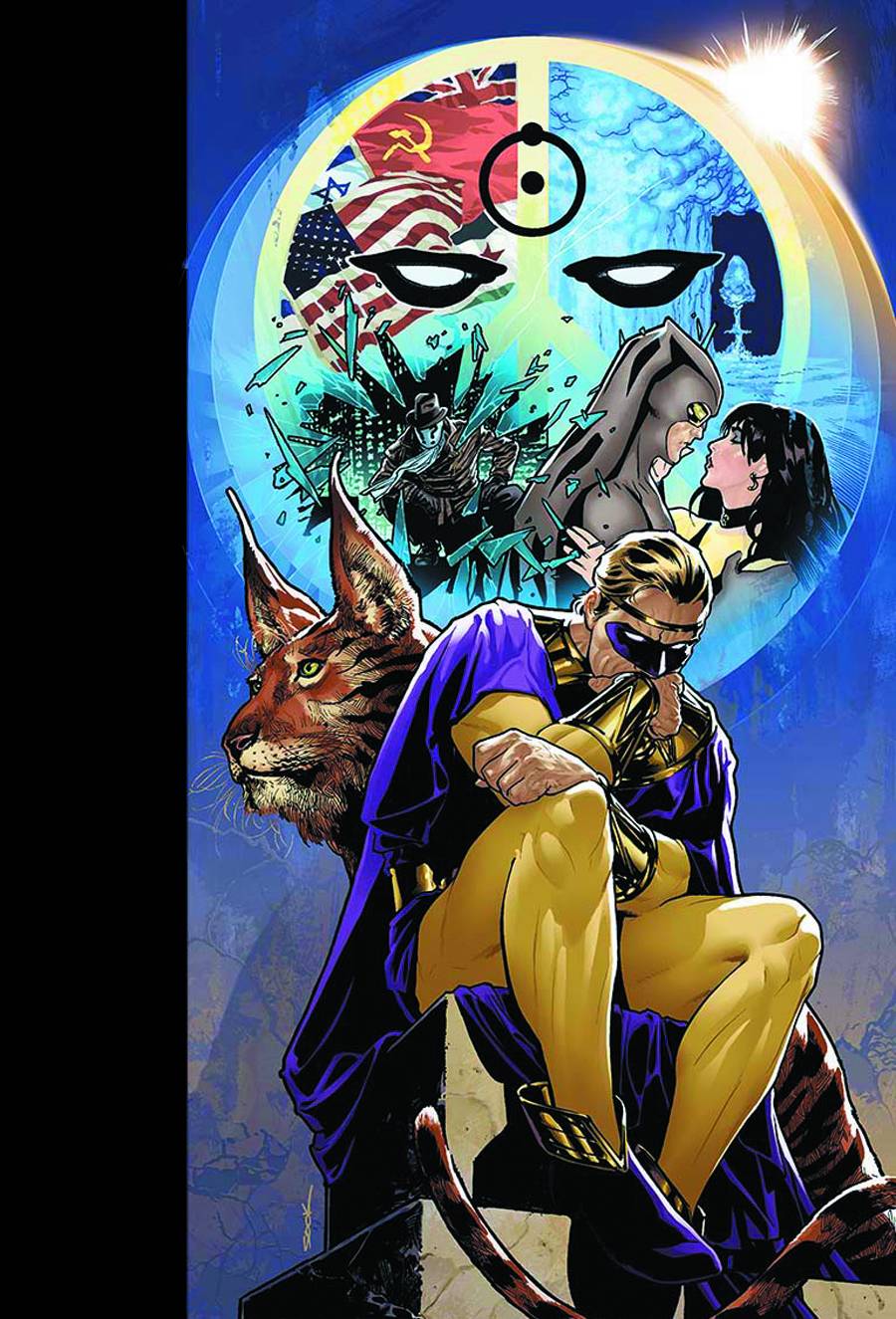
This makes the argument that there are good things to having a black and white view, though one can be too extreme with that viewpoint and what measures they would take to enforce such views.
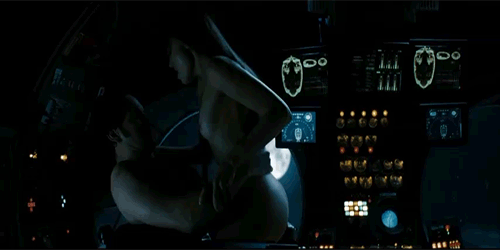
Third, that whole scene of Laurie stating to down how precious a loving relationship is, how in desperate times people tend to realize how much they need each other, how much they should love each other. In this moment after they agree to keep silent for this squid charade, Laurie realizes the importance and significance of love, and knows she loves Dan (and needs to be loved). The most precious thing for humans. But the film doesn’t want to portray this moment, which is a very significant moment. Because it’s too old-school, too girly, to innocent and cheesy of a view, too dramatic of a portrayal, or whatever reason the film decided to use to justify women being too good to have moments like this. An excuse to not acknowledge the importance of love in this way, that people need each other in an hour of desperation, of emotional need. It may be too cheesy and outdated to some, but the message sure as hell shouldn’t be; and it worked for me damnit! And I argue it’ no cheesier than the sex scene that is in the movie! Hallelujah!
Fourth and last, the fallout from the incident Veidt caused. As a result of the USA and USSR making an alliance, the film has the owner of Pioneer Publishing (very patriotic, considered right-wing, very sensical news publishing company that Rorschach trusts above all else) make this statement:
“Seymour, we got nothing to write about anymore. Everyone in the country, every country in the world are holding hand now. Singing songs about peace, love. It’s like living in a goddamn global hippie commune.”
Guy who runs Pioneer Publishing in Zack Snyder’s Watchmen
Basically John Lennon’s vision for a perfect world happened. Rubbish! This is a major contrast to the comic which shows what the potential downsides are to “world peace:”
I’ll eat food from the place if I must, but I won’t have Russian spoken in this office.
[…] thanks to this goddamned, ass-kissing accord!
[…] Nobody’s allowed to say bad things about our good ol’ buddies the Russians anymore, so bang goes a two-page column!
Ch.12 p.32
Censorship. Something many fear would happen in a one-world government, like what happens in most, if not all, Communist countries. This is exemplified even further with this “One World / One Accord” poster that we see pasted on a wall on page 31 of Chapter 12 in the comic. NWO fears realized as a result of this peace. Is it that bad? Is it that good? We don’t know for sure, it’s up to the reader to decide for themselves. That there is a downside to world peace and having the dream of John Lennon realized. Like I said, this comic critiques virtually all sides, the hippies, the war-mongers, and everyone in-between. And the film fucks that up by being one-sided about it. Implying that Rorschach is probably wrong, and that it would be a bad thing for his journal to be made public which would blow the lid off of the entire thing, assuming drastic steps wouldn’t be taken to shut down anyone and anything that would try to make such a thing public, which would create strife in this government-controlled environment which may have made things worse than they were prior, when it could’ve been resolved with countries calling their bluffs and backing down during the cold war, at the risk of there being an actual nuclear holocaust. Among other lines of thought one could go down with this scenario. And the film removes any of that critical thinking shit.
Part 7: Epilogue – Compromising in the Face of Armageddon
I understand that compromises have to be made when transitioning a story from one medium to another. But it’s very frustrating to see a film that dangles the notion of being capable of transitioning the story with little to no compromise, but decides to compromise it anyway for stuff that only serves to dumb it down needlessly. Just about every single one of these flaws that have been pointed out could’ve been easily addressed during the film’s production. Easily. But a combination of Zack Snyder’s thing for more flash and less substance, combined with corporate Hollywood’s meddling of forcing the screenwriters (or assigning specific screenwriters) to alter things so that they’re more PC-culture and less “outdated” by their standards. It all served to damage the story to the point where it’s no wonder Alan Moore didn’t want his name associated with it. Probably because they can’t deal with some of these brutal (albeit sometimes subtle) messages that take aim at everything they stand for. It’s amazing enough that they still allowed some dialogue from Rorshach to mention the hypocrisy of liberals, which is about as far as the film went when it came to criticizing them along with everyone else.
The film is stylish, and does a few things that I liked that did add to the story. But the cons very much outweigh the pros (including the actor playing Veidt being completely miscast), with alterations that simplify things too much, if not become outright betrayals of the themes in the comic itself. Including making the protagonists actual superheroes with above-average strength, as opposed to just being, you know, people. Plus there’s an absence of the dark humor littered throughout the comic! Which was the whole point of the smiley face, knowing how much of a joke things are (and the squid is a part of all that, so double fuck you people who think it’s semi-goofiness is a bad thing; you don’t get the joke).
Not to mention some moments in the comic that are surprisingly relevant today; moments I knew the film wouldn’t have the balls to include. Such as the New Frontiersman mentioning how the KKK wasn’t originally and primarily designed to be a black hate group, but wanted to preserve what they deemed a traditional way of life and a traditional American culture. How news sensationalism “stirs up old prejudices and hatreds into a bloody wave of civil disorder.” And that moment when the guy working at Pioneer Publishing mentions the headline “Jewnited States of America.” How many who offer extreme points of view or vigilante lifestyles are called nazis (thus attempting to shut down any form of debate on the matter by shaming others for even considering such points of view). Man was this comic ahead of its time.
Read the graphic novel. Only watch the film for criticism’s sake.
The great warriors are those who fight for their ideas and ideals, despite the fact that they receive no recognition from their contemporaries. They are the men whose memories will be enshrined in the hearts of future generations.
Adolf Hitler, Mein Kampf Ch.8.4
